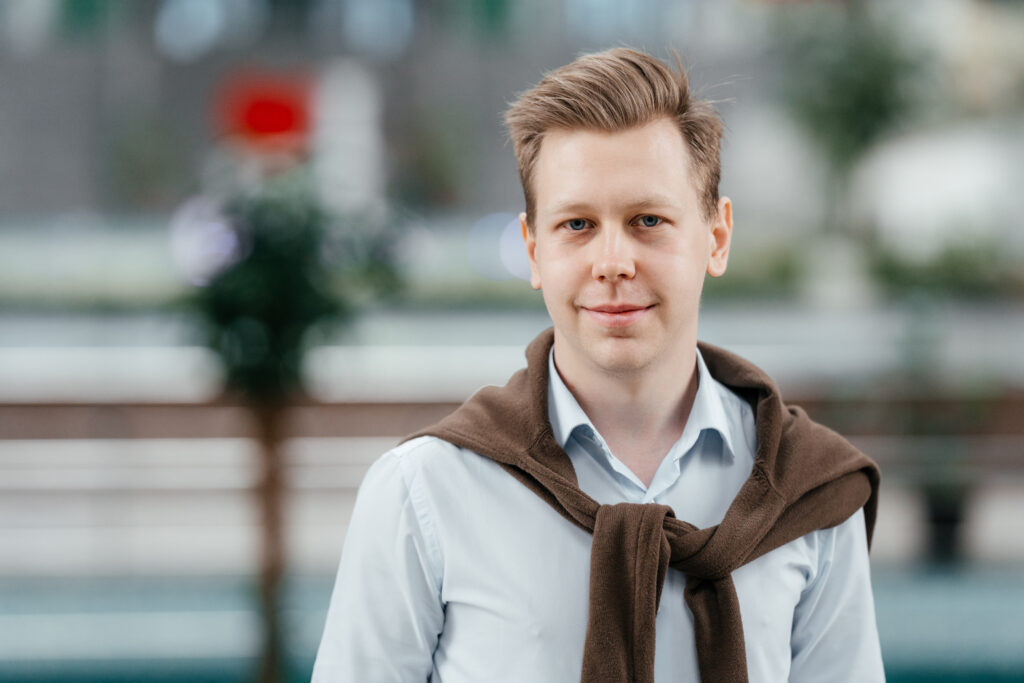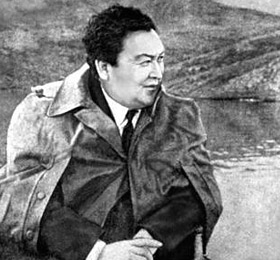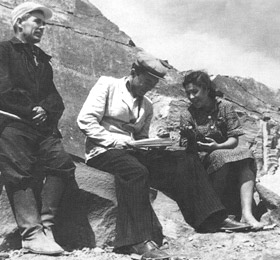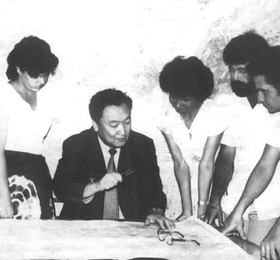Daniil Filimonov
Specialization: Robotics engineering. Internship: École Polytechnique Fédérale de Lausanne, Switzerland.
 In the summer of 2024, Daniil, a robotics student, completed a research internship at one of the best laboratories in the world in Switzerland. In addition to robotics, the 23-year-old Kazakhstani enjoys rock climbing, playing The Witcher games, going to the theater to watch a ballet, and studying history and philosophy… In this interview, a student at Nazarbayev University from Taldykorgan tells how he won the Yessenov Foundation Research Internships Program competition, what he studied in Lausanne, and what results he came back with.
In the summer of 2024, Daniil, a robotics student, completed a research internship at one of the best laboratories in the world in Switzerland. In addition to robotics, the 23-year-old Kazakhstani enjoys rock climbing, playing The Witcher games, going to the theater to watch a ballet, and studying history and philosophy… In this interview, a student at Nazarbayev University from Taldykorgan tells how he won the Yessenov Foundation Research Internships Program competition, what he studied in Lausanne, and what results he came back with.
Why and how did you choose this specialization?
In kindergarten, while other boys were playing skirmish games, I preferred playing with construction kits, assembling large houses, cars, and mechanisms. And when I was in 8th grade, my computer science teacher, Elena Ovanesovna, introduced me to the world of programming. Robotics is a science that combines both of these things. Since 9th grade, I have been determined to dedicate my life to it.
How did you first learn about the Research Internships Program competition of the Shakhmardan Yessenov Science and Education Foundation, how did you participate in it, and what do you remember most?
I first heard about it from my senior student friends, in my first year at university. I remember that even then, they recommended to start building my portfolio and apply for the Program. I didn’t succeed the first time, but after working on the mistakes, I submitted my application again a year later, passed the competition, and received an email saying that I was the winner.
What helped you win?
People. I didn’t plan to submit my application the second time because I had doubts about my chances. But my girlfriend persuaded me to change my mind. Together with my mentor, Aknur Karabay, who had also won the Research Internships Program (she was a Data Scientist at the Institute of Smart Systems and Artificial Intelligence at that time), we worked on each stage of the competition. People in my close circle supported me with advice and shared their life hacks, for which I am grateful to them all.
Daniil, what life hacks can you share with the participants of the Foundation’s future competitions?
First of all, understand why you are participating. Why do you want to do an internship outside of Kazakhstan? What is there that we don’t have here? Secondly, don’t compare yourself to previous winners. It’s better to recognize your own strengths and make the most of your unique qualities. And finally, no man is an island. A strong support group will help you reach unprecedented heights.
I would recommend that the winners not be afraid to ask for help, especially in another country. For example, if you ask someone from the laboratory to meet you at the airport, the chances of going to the wrong place, as happened in my case, will be zero. I also recommend exploring student programs offered by different airlines. In my case, Qatar Airways offered a 10% discount on the ticket simply because I was a student. It wouldn’t hurt to get a bank card that provides access to airport lounge areas and offers generous cashback (such cards are issued by various banks in Kazakhstan). Not only will you save money on buying food at the airport, but you will also be able to take a shower and even relax in peace.
Where did you do your research internship?
I chose the CREATE laboratory at the École Polytechnique Fédérale de Lausanne (EPFL). It is the best higher education institution in Europe in the field of robotics. The laboratory is led by Professor Josie Hughes, who focuses on soft and reconfigurable robotics. She also develops walking robots, smart cooking systems, etc.
What did you work on there?
I would come to the laboratory and meet with my supervisor, postdoc Sareum Kim. Before I started working, we would discuss the plan for the day. Sometimes I sent a new part of my robot, just modeled in the program, to be printed. From time to time, I picked up a soldering iron to refine the circuit board—the heart and brain of the robot. Sometimes I enthusiastically typed away on the computer keyboard, working on the robot control code. Professor Josie Hughes periodically approached me, and we discussed the results and challenges, adjusting the project goals.
What kind of project were you working on?
Imagine a caterpillar-tracked tank, but with a flexible magnetic belt that has no rigid connection between the front and rear drives. This means it can freely change the length of its body, adapting to environmental conditions. Even if it flips over, the robot will be able to return to its original position on its own. The scope of application of such a robot is wide: it is not afraid of bad roads and can reach hard-to-access locations.
What did you learn during the internship?
I significantly improved my understanding of how to write scientific papers properly, plan and conduct experiments, and deepened my knowledge of professional ethics. I would like to integrate the experience gained at the Swiss laboratory into the laboratory at my university. For example, I would introduce weekly laboratory cleanups, scientific training sessions, and a Sports Thursday every two weeks. What I liked was that the Swiss don’t even consider overtime work. Rest and personal time are just as important to them as working hours. An excellent work-life balance positively impacts both health and work.
Daniil, what results have you achieved in three months?
I managed to fully design and build the robot, as well as collect data from all the experiments. This is a very tight timeframe in the field of robotics. Fortunately, the professor and the postdoc agreed to continue working online. We were able to write a paper, submit it to the IEEE Robotics & Automation Magazine, receive feedback, refine the article, and file a patent application.
What interesting things have you been able to see in your free time outside of work in the laboratory?
I enjoyed the beauty of the canals in Amsterdam and the ancient ruins in Lyon. I met my relatives from Germany for the first time. Switzerland remains in my memory as an incredibly peaceful, safe, and extraordinarily beautiful place. There are mountains, lakes, and meadows everywhere, and people live a quiet, prosperous, and secure life.
What are you doing currently, and what are your plans?
I am finishing the final year of my bachelor’s degree and continuing research in my laboratory at Nazarbayev University, where I am developing mobile robots based on tensegrity structures. These structures have much in common with muscles and bones. Currently I am focused on designing a robot that can fall from a height of over one meter without sustaining damage. This work is the basis of my thesis which I hope to defend this summer. At the same time, I am applying to Master’s and PhD programs at universities around the world that are known for their strong research potential in robotics.
20.03.25, Stories
Seen by: 1,033






